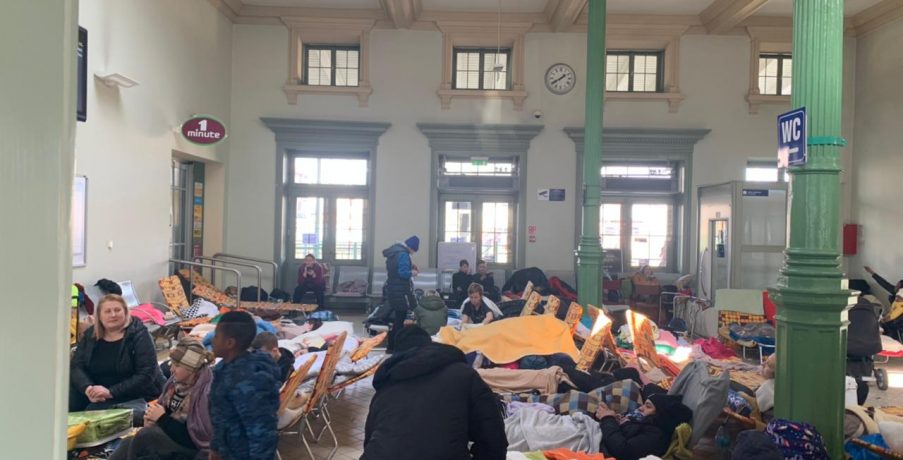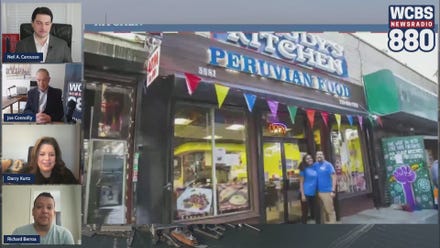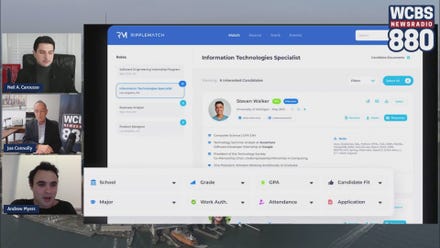
-
Masks are off at NYC gyms, but pandemic habits are hard to break
Post Views: 486By Joe Connolly and Neil A. Carousso
NEW YORK (WCBS 880) — This is the first week that mask and COVID-19 vaccine requirements at fitness gyms in New York City have been lifted, bringing a sigh of relief to many as the world marks two years since the pandemic started. Despite the loosening of COVID-19 restrictions, not everyone is eager to return to the gym.
Capacities at SLT fitness studios remain sluggish in Manhattan, which founder and CEO Amanda Freeman believes is partly due to remote work.
“Our suburbs have recovered much better,” Freeman said on the WCBS Small Business Spotlight, sponsored by Dime Community Bank.
SLT has 17 studios open across New York, New Jersey, Connecticut and Massachusetts. They closed nine gyms permanently during the pandemic and pivoted to virtual exercise classes.
“I believe that the future, like most people in the fitness industry believe, is an omnichannel future fitness where you might not get to a studio as many days of the week as you did prior to the pandemic,” said Freeman.
She told WCBS 880 that there are some who only want to workout at home and others who only want to exercise at the gym, but most are enjoying the convenience of a hybrid situation.
“Personally, I don’t love working out at home, but you know that it’s not horrible and sometimes you can’t get to a studio.”
Freeman said they spent the last two years perfecting their at-home and on-demand classes.
“It’s nothing I ever thought I would do, and again, which is why it didn’t exist before the pandemic,” she said. “It was something I felt like we had to do for the future of the business. The rest of our business was contracting so deeply and who knew how it would be post-pandemic.”
She believes there are still opportunities and new categories for SLT to explore in the at-home fitness space. SLT currently offers a monthly subscription to its on-demand exercise videos. They upload new videos every Tuesday morning. Some workouts don’t require equipment and others do, which SLT is now manufacturing and selling.
“Our workout is best described, although I don’t like to say it, but I say it’s either a high-intensity version of Pilates or we say if cardio strength training and Pilates had a baby, it would be SLT.”
SLT is an acronym for strengthen, lengthen, tone.
The biggest hurdle with virtual exercise classes, Freeman said, is replicating the in-person training.
“In a lot of ways it’s form; it’s form correction,” she explained. “How do you bring the detail of the corrections and the detail of the form?”
The fitness studio owner relies on instructors to be charismatic and knowledgeable.
“You need so much to be that, what I call a ‘star-structor,’ and at-home is so much about star-structors, and honestly, SLT has never been about a star-structor business,” said Freeman. “We like hard working, smart, talented instructors. But, the world of fitness has really gone the way of like the cult of personality of fitness. And it had gone that way, then it was a little not that way, and then, when at-home became so big, it was 100 percent that way where one instructor could have 1,000 people doing the same workout.”
See more on the changes in the fitness industry and SLT’s virtual exercise classes on the WCBS Small Business Spotlight video above.
-
INTERVIEW: Refugee who escaped to Poland helps fellow Ukrainians seeking safety
Post Views: 567By Neil A. Carousso
NEW YORK (WCBS 880) — More than 1 million people have fled Ukraine since Russia invaded last week, accounting for 2% of the Ukrainian population.
A refugee who escaped the war and bloodshed in Ukraine is now helping his fellow Ukrainians cross the border into Poland, where they have been welcomed with open arms.
Mykola Golubei escaped Kyiv with his wife last week after waking up in the middle of the night to Russian rocket attacks.
“Suddenly I realized that I could die every moment,” Golubei told WCBS 880. “Each second could be the last second of my life because the rocket could get in the building where I was so I just started catching all the things I could, taking my wife. My mom was in shock. I realized that the war started and my wife said, ‘No, no it’s something, maybe gas, or something.’ And we ran on the subway and I have a WhatsApp chat with three of my close friends and one of them typed in the chat, ‘Hey guys, I just saw the light of the rocket attack.'”
Golubei and his wife went got on a train at a nearby station, without even knowing where it was going, just to escape Kyiv.
He realized halfway through the trip that the train was bound for Poland.
For the first two days, he and his wife were in terrible shock, jumping at every sound, fearing that the war had reached Poland.

A shelter in Poland where Mykola Golubei is staying after fleeing Ukraine. Photo credit Mykola Golubei. By the third day, he started receiving messages from others seeking help to find a car or bus to get out of Ukraine.
Golubei is now in a shelter in Poland, near the Ukrainian border, where he is organizing efforts to help citizens who are seeking refuge. He and a group of at least eight other people started a coordination center for volunteers to assist Ukrainians seeking safety.
“We need food, we need medicine, we need sleeping bags, but first of all we need the war to stop,” he said. “We need a lot of government organizations to help the Ukraine army, but a lot of people just go and help to protect the citizens — they don’t have ammunition, they don’t have the protection on their head, protection on their heart. We don’t ask for rockets, we just ask for something to protect people.”

Inside look of a boarded up bomb shelter in Ukraine. Photo credit Image courtesy of Mykola Golubei. Golubei said he feels guilty that he is safe in Poland and is trying to get others out.
“I feel shame and guilt,” he said. “My wife and me feel the guilt that we are here now and safe and our friends are there and so that’s why we give, all of us, our time and energy and desire to help other people.”
The Russian invasion of Ukraine has upended not only his life, but the lives of all Ukrainians, and now Golubei is solely focused on the other refugees that he is trying to help.
“You know, do you have experience when you have a plan? Plan on vacation? Plan next week? I have a lot of plans and now my plans are just the next right action,” he said. “Last Wednesday, I had a plan with my wife. We went to buy pets, two rats in a zoo shop, it was our plan, and we were thinking which of them we wanted to buy the next day, and the next day the war started and so all of my plans are just ruined. So I try to be as busy as I could all day long, calling somebody, typing, put post, go to the train station, talk to the people.”

Mykola Golubei said his friend sent him this photo of people hunkering down in a bomb shelter in Ukraine. Photo credit Mykola Golubei. Golubei said most of his friends have decided to stay in Kyiv and Kharkiv and are ready to die for Ukraine.
He is heartbroken by the images he is receiving from friends and family of bomb shelters that have been set up in the place where he calls home.
“I have just one question — why?” Golubei said. “I couldn’t explain myself why Vladimir Putin started doing this because if he had all the power in the world he could build a university, he could start an educational program, he could do everything with the money that he’s got. Why did he start the war? I don’t understand.”
There are several organizations that are collecting donations for Ukraine relief efforts including the Ukrainian Red Cross and the International Rescue Committee, the United Nations World Food Programme, Doctors Without Borders among others.
-
Bronx Restaurant Grows Revenue during Pandemic after Key Improvement
Post Views: 644By Joe Connolly and Neil A. Carousso
NEW YORK (WCBS 880) — Richard Berroa is taking back control from delivery apps that cut into his profit using his own newly-optimized website, which has opened the door to entirely new revenue streams while restaurants like his have suffered numerous setbacks in the recovery from the COVID-19 pandemic.
Berroa is an FDNY paramedic who opened Claudy’s Kitchen, a Peruvian restaurant in the Bronx, with his wife Claudia in June 2020.
“We knew that we’d be mostly takeout,” he said on the WCBS Small Business Spotlight, sponsored by Dime Community Bank.
But, the website Berroa first created on his own did not meet today’s demands for online ordering. The Bronx Chamber of Commerce connected Claudy’s Kitchen with the Small Business Resource Network – a public-private partnership created during the pandemic to help small businesses with digital marketing and technology resources and training.
“Having the third parties did help us survive and move forward, but you know, we’ve gotten past that stage and now we want to keep more of the share,” said Berroa.
BentoBox specializes in developing websites and digital ordering systems for restaurants while allowing establishments ownership of customer data for marketing, unlike the third-party apps. The company overhauled the website for Claudy’s Kitchen with the goal of matching the customer experience online with the quality of service patrons expect in-person.
“We really have their whole digital storefront available to them, so that’s become increasingly important through COVID,” said BentoBox chief marketing officer Darcy Kurtz. “I think kind of the post-COVID modern restaurant is going to really have to have all this digital property in place because consumer behavior is just permanently changed at this point.”
She told WCBS 880 that 77 percent of diners go online before heading to a restaurant.
“There was a very real concern that technology impeded their most important thing, which was delivering hospitality,” Kurtz said, continuing, “Hospitality at its roots is about relationships. It’s about being in-person. But, what we found is that technology actually can enhance hospitality. It doesn’t have to be a barrier to (it).”
“The big thing is that we’re getting more in-house orders,” said Berroa. “I see the Grubhub and the Uber orders dipping down while our in-house Bento(Box) is going up. So, so far it’s working.”
BentoBox’s technology also allows restaurants to upsell and cross-sell customers at checkout in a way that adds value to the customer experience. As a result, Berroa said, Claudy’s Kitchen is getting more combination orders that increase the average per ticket.
“If you’ve done it lately, you will see things like, ‘Hey, you bought the hamburger. Are you sure you don’t want fries?’ Some of the things that happen naturally in-person when you go to a restaurant, you want your online experience to be able to help do that so that your online ordering is equal or higher total ticket prices than your dine-in. You don’t want that to be some trade-off that you’re having to make,” said Kurtz.
Claudy’s Kitchen also has a section for events that BentoBox sees as one of many incremental revenue streams that can hedge against COVID surges.
“You’ve got to find ways whether it’s online ordering, whether it’s selling your merchandise, sell your barbecue sauce, sell your T-shirts, you know, do events, and have event management, but just find something else to give you an ongoing revenue stream so that you can level out some of that variability of the dine-in,” Kurtz explained.
See the platform BentoBox developed for Claudy’s Kitchen along with growth ideas for restaurants on the WCBS Small Business Spotlight video above.
-
Brave Ukrainians and Russian Citizens Fight Back Against Invasion, U.S. Braces for Fallout
Post Views: 743Produced by Neil A. Carousso
NEW YORK (WCBS 880) — Ukrainians are fighting for their country.
A college student whose family is in Kyiv gives WCBS 880 a glimpse into the Russian invasion as they move to take over the capital.
Anchor Steve Scott examines whether U.S. sanctions go far enough to punish Russian President Vladimir Putin and their impact on U.S. gas prices and cybersecurity on The 880 Weekly Rewind.
-
RippleMatch Platform Improves Early Career Hiring Process
Post Views: 870By Joe Connolly and Neil A. Carousso
NEW YORK (WCBS 880) — RippleMatch helps college students and recent graduates launch their careers while improving employee retention rates by using data to find the best fit.
“If you’ve ever had the experience of applying for a job, it’s often that you throw your resume into a black hole and just sort of hope that someone maybe gets back to you,” said RippleMatch founder and CEO Andrew Myers on the WCBS Small Business Spotlight, sponsored by Dime Community Bank.
“With RippleMatch, you know, we only present opportunities on the platform when a candidate’s very likely to be a good fit. They generally hear back really, really quickly. They always get an answer,” he said.
Myers said that 66 percent of candidates on RippleMatch have gotten called for an interview.
He founded the company in 2015 in his dorm room at Yale University after feeling dejected when he only got three or four job interviews out of 55 applications. Calling the process “overwhelming” and “daunting,” Myers sought a better way for his peers using data predictive analytics to match early career candidates with jobs where they are most likely to succeed.
“Our mission (is) to replace job boards,” he said.
RippleMatch is free for candidates. It earns all its revenue from employers that now include Amazon, eBay, and Ernst & Young.
“One of the deals we make with every company that we work with is they commit to certain standards in terms of candidate experience and how they’re going to get back to candidates, and very typically prioritize the RippleMatch candidates that they’re getting matched with in terms of getting them into the interview process,” said Myers. “We just establish workflows on the back end that sort of get candidates into the company as fast as we possibly can, which is generally an advantage when it comes to candidate experience.”
He said retention rates among Gen Z employees that used RippleMatch are much higher as a result.
“The single thing (Gen Z employees) want most is professional development,” Myers said, continuing, “Within our own Gen Z workforce, we’ve seen really good retention within roles and I know a lot of our stronger companies have as well. So I actually think that good professional development with Gen Z employees can actually be a pretty effective strategy even in the heart of the Great Resignation. And, I think that there’s actually more shifting going on in sort of later stage positions than there are with Gen Z compared to millennials who are already pretty jumpy themselves. There’s not like a big Gen Z jump or anything like that that we’re seeing.”
He said RippleMatch has upended the belief that the best talent comes from prestigious universities and it has the data to support it.
“If you’re clinging to the notion that a candidate had to go to Princeton or you’re over attached to degree pedigree, I think it can actually mean you miss out on phenomenal talent,” said Myers.
See how RippleMatch works for both job candidates and employers on the WCBS Small Business Spotlight video above.
News Stories
Social Feeds

VIDEO: Told the airline to book us on the next flight out (SPONTANEOUS TRIP!)

VIDEO: The Taylor Swift Effect | WCBS Business Breakfast

VIDEO: Future of NYC | WCBS Business Breakfast

VIDEO: Reasons for New Yorkers to be Optimistic | WCBS Business Breakfast

VIDEO: NYC's AI Chatbot | WCBS Business Breakfast






